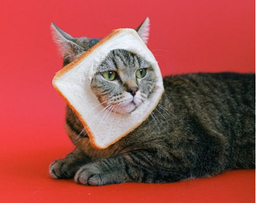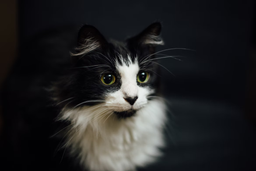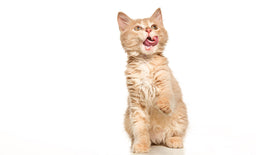What to feed an old cat to gain weight—Untamed knows the answer
It seems like only yesterday your furball was a kitten wreaking havoc around the house. In what feels like no time, they begin to sleep more and move less. When they turn ten, felines enter their golden years and start showing signs of old age. They also start losing weight. There is usually no reason for concern as old cats tend to be less active and consequently eat smaller amounts of food.
Keep in mind that losing weight rapidly isn’t entirely normal. Senior felines can get skinny, especially if they get one of many age-related illnesses. What to feed an old cat to gain weight? We will present the best diet for skinny kitties. Untamed also tackles the following issues:
- How to know if your cat is skinny
- The possible causes of rapid weight loss
- Illnesses related to weight loss
- How to make your cat gain weight
- Best food to put some kilos on your old furball

I’m not skinny! I’m fit!
Source: Cedric VT
How to know whether your kitty is skinny
Determining whether your cat is too skinny is tricky. With old age, their skin tends to get saggy and hang over their bones, and their muscle mass starts disappearing. You can figure out whether your kitty is too skinny in two ways:
- Checking the body condition score—Vets use the body condition score to check a cat’s weight. Next time you visit your vet, ask them to evaluate your feline
- Doing the hand test—Feel your cat’s ribs. If they feel like your knuckles, your furry friend is skinny

I’m not as young as I used to be. That’s why I sleep all day.
Source: Matheus Bertelli
Why won’t my cat eat?
Appetite loss in cats is often temporary. You should sound the alarm if your furball stops eating for more than 24 hours. The causes vary, but decreased appetite is typically related to:
- Changes in the surroundings—One of the reasons your cat stopped eating might be the change of scenery, especially in the case of older felines. If you and your kitty moved, or you changed the surroundings in any way, your furry companion might be under stress because cats are creatures of habit. Once they get accustomed to the new place, they will start eating normally
- Illness—If you suspect that your kitty’s not eating because they’re ill, take them to the vet for a check-up immediately
- Mental problems—Cats are complex beings, prone to depression and other psychological problems. These issues are often linked to a new addition to the family, such as a baby or a new pet
- Vaccination—If you’ve taken your kitty for vaccination recently, this might be the reason they stopped eating. Vaccines can make kitties lose their appetite, but the issue doesn’t last long in most cases

See hooman—I’m just the right weight!
Source: Giacomo Dabbon
How to get a cat to gain weight fast
Whatever you do to make your furry friend gain weight, you should do it slowly. Introduce changes, one by one, over one to two weeks. Trying to get your cat to gain weight fast may be dangerous for their stomach and digestive system. Here are the steps to take:
- Reduce their stress level
- Consult a veterinarian
- Feed them small but frequent meals
- Warm up their wet food
- Add some healthy treats to their diet
Reducing your kitty’s stress level
Even though stress usually causes a cat to become overweight, it can also contribute to weight loss. Healthy and happy cats are more likely to have a good appetite. Try to figure out whether there’s anything in your flat or house that makes your kitty uneasy. Make sure that you remove all potential stressors. When your cat’s ill-at-ease, they will eat less and lose weight.
Consulting your vet
Ask your veterinarian whether they can suggest particular medicines or supplements that stimulate appetite. The latest hack is a skin and gums gel. You can gently rub it on your kitty’s skin, and their appetite should return.
Feeding your feline friend small but frequent meals
Some cats’ stomachs shrink with age, so they cannot digest large amounts of food. Offer smaller portions of their favourite food more frequently. Your cat will get the amount they need to gain weight while having the time to process the meals.
Warming up wet food for your kitty
Since older cats’ senses tend to weaken with age, your cat might reject a meal because it isn’t enticing anymore. You can warm up your kitty’s dish to release the aroma and tickle their senses.
Keep the temperature up to 38.5°C, which is close to their body temperature.
Giving healthy treats to your cat
Healthy treats can help your cat gain weight, especially if they’re high in calories. Don't overdo it because cats can't break carbs properly, so they might end up with indigestion. It’s better to stick to meat snacks because they are tasty and healthy for your old furry friend.

I don’t want to eat because I want to sleep all day long!
Source: jacquesandgabby
Best food to make a cat gain weight
Carbohydrates are an easy way to gain weight, but cats won’t thrive on them. Simple and complex carbs can cause more harm than good by provoking allergic reactions, so don’t add them to your senior feline’s diet. The best way is to follow their natural feeding pattern and opt for food with:
- High amount of animal protein
- Some healthy animal fat
- No grains, fruits, or vegetables
Cats are obligate carnivores, so their body is designed to process animal rather than vegetable proteins. They need specific amino acids, like taurine and arginine, which they can synthesize only from meat. The following table presents the bioavailability of the most common protein sources:
|
Protein source |
Biological value |
|
98% |
|
|
94% |
|
92% |
|
|
Lower than 65% |
Some vets recommend feeding your skinny cat kitten food because it is rich in calories and has high percentages of protein and fat. High-quality cat food for adult felines should contain all the essential ingredients in proper doses.

Your cat will gain weight in a healthy way with Untamed!
Image (c) Untamed
A picky cat needs to gain weight? Untamed has the solution
Your senior kitty will lose muscle tone as they grow older, but top-notch food can slow down the process. Untamed helps your feline companion maintain or regain their muscle mass.
Our vet-formulated recipes are excellent for picky cats who refuse to eat because Untamed dishes taste great and sweep even the fussiest felines off their paws. Untamed suits cats of all breeds, including Persians, Siamese, Maine Coon, Bengals, Ragdolls, and British Shorthairs. Our products can do wonders for your feline regardless of their age, so adults and kittens can also benefit from Untamed. Even picky pregnant queens and lazy neutered males cannot resist our delicacies. We respect the highest standards of ethical food production by:
- Using human-grade meat—Untamed uses only premium quality human-grade ingredients. We don’t grind slaughterhouse scraps or add vegetable protein to our meals. Our products contain two times more protein than the industry standard and are free of all known allergens. Your cat will feast on the finest cuts of chicken and duck breast, salmon, sardine and mackerel fillet, chicken liver, and shrimp
- Following vet-formulated recipes—We created our recipes in collaboration with vets, so you can be sure that your cat will get all essential nutrients in their meals
- Gently steaming our dishes—Without heavy processing, the aroma and essential nutrients are preserved, and the food tastes exquisite
To order your first taster pack, take our TRY NOW quiz, tell us all about your feline companion’s taste, and get a tailor-made meal plan at the best price.

This food is tasty! I want more!
Source (c) Untamed
How to get Untamed for your skinny senior cat
Ready to go Untamed? With us, ordering cat food online is super convenient. All you should do is:
- Visit our TRY NOW page and tell us about your furry friend
- Review your meal plan
- Place your order
We will deliver it in a day. We’ll send your cat’s favourite products around the same time each month. If you decide to pause, skip, or modify a delivery, you can do it from your account in a few clicks.
Besides offering the best cat food subscription in the UK, Untamed runs an environmentally friendly business with a neutral carbon footprint. We get our meat from sustainable sources and use recyclable packaging only.
What cat parents say about the Untamed effect
All cat parents who switched to Untamed are delighted with the Untamed effect on their felines’ well-being. Check out the benefits and improvements in the following table:
|
Time on Untamed |
Improvements |
|
One week |
|
|
Two months |
|
|
Six months |
|
|
One year |
|
Can dry food help cats gain weight?
Even though wet cat food is the closest to the feline natural diet, dry food can help with weight gain. The table below presents the nutritional value of average cat kibble:
|
Quality |
Ingredients |
|
Low in |
|
|
High in |
|
Dry cat food usually contains more artificial ingredients than wet food. Although often inferior in nutritional value, kitty biscuits tend to help with quick weight gain because of the high-calorie content. A common issue with dry food is that your old cat might be unable to chew it if they have dental problems.
The best way to make your kitty gain weight is to combine dry and wet food. Biscuits provide the necessary calories, while gravy and jelly add the necessary proteins, amino acids, and fatty acids to the mix.
What can cause rapid weight loss in senior felines?
Several serious degenerative diseases come with age. As your cat grows old, their bodily functions start slowing down. The following conditions cause sudden weight loss in senior felines:
- Dental issues
- Dysfunctional digestive system
- Frequent hairballs
- Urinary tract infections
- Joints and muscles problems
- Parasites
Dental issues
Older cats are prone to gingivitis, tooth loss, and gum recession. These dental issues can make eating difficult and cause rapid weight loss.
Eating solid food like kibbles can be painful for your furry companion, so you should switch to semi-moist or wet food to make eating easier for them. You can also soften the biscuits with:
Sensitive digestive system
As they grow older, your cat’s digestive system becomes more sensitive, making digesting difficult and leading to the following problems:
- Nausea or vomiting
- Diarrhoea or constipation
- Irritable bowel syndrome (IBS)
If your cat is eating well but still losing weight, digestive tract conditions should be checked first.
More hairballs
Coughing up hairballs is stressful for your kitty. Unfortunately, hairballs are more common in old age as cats groom frequently. Because regurgitating hairballs causes stomach pain, your feline friend might stop eating.
Urinary tract issues
Your cat might stop eating if they have a urinary tract condition, like cystitis or bladder stones. Because of the pain, your old kitty might stop eating and start losing weight fast. Lower urinary system illnesses are treatable and preventable. It’s essential to keep your feline hydrated so the organs can function properly.
Issues with joints and muscles
Another condition connected to your kitty’s appetite has to do with joints and muscles. If your cat has arthritis and joint degeneration—pretty frequent in senior felines—they might stop eating because of the pain. Pain is a major appetite killer for cats, so don’t hesitate to take them to the vet if they stop eating.
Parasites
Parasites are common in felines and other pets. They can be wormlike or single-cell microscopic organisms. A parasitic infection can make your cat skinny, so make sure to have them vaccinated regularly and give them anti-parasite meds.

I may be old and grey, but I still like ear scratches, hooman!
Source: Karlis Reimanis
Severe chronic conditions that cause old cats to lose weight
Most cats develop at least one age-related illness that can affect their weight and mood. The most common are:
- Diabetes
- Hyperthyroidism
- Cancer
- Kidney disease
- Heart problems
Diabetes
Diabetes is the body’s inability to produce insulin. Stress and an inadequate diet full of carbs are often the primary culprits, although genetics plays a significant role.
If your cat stops eating and starts drinking water excessively, it might be time to visit the vet. The good news is that diabetes is not debilitating with a proper diet and insulin shots.
Hyperthyroidism
Hyperthyroidism develops from a benign tumour in the thyroid glands, which can lead to the overproduction of thyroxine hormones. Hyperthyroidism may cause:
- Vomiting
- Diarrhoea
- Muscle deterioration
- Increased urination
This illness can lead to your kitty overeating or rapidly losing weight because it often affects their mood.
Cancer
Cancer can develop on all internal organs and, as a rule, leads to gastrointestinal problems. If your feline has cancer, they won’t be able to eat or digest food properly.
Unfortunately, old cats are prone to all forms of cancer, so you should visit the vet regularly after your feline turns ten. The most common symptoms are:
- Loss of appetite
- Diarrhoea
- Vomiting
Kidney disease
When kidneys stop functioning, the toxins cannot be flushed out of the body properly. Kidney disease may lead to the severe loss of muscle mass. Most commonly, cats will have no appetite when their kidneys fail, consequently losing weight.
Heart problems
Cats with heart disease often suffer from nausea and diarrhoea, which leads to the loss of appetite and anorexia.
What to feed a kitten to gain weight
Kittens start weaning at about three to five weeks of age. Before that, they feed on their mother’s milk exclusively. If the queen isn’t present, the survival of your little furball depends on you.
Your vet will most likely recommend a kitten milk replacer (KMR) as a great substitute for mother’s milk. KMR will help them gain healthy weight. Make sure your kitten is always dry and warm. If they spend too much energy maintaining their body temperature, they might stop gaining weight.
Once your kitten gets their first teeth, you can introduce solid food mixed with KMR. As kitten food is high in calories and essential nutrients, they should gradually gain weight.

![Best food for Ragdoll cats in the UK [Broken Down]](http://untamed.com/cdn/shop/articles/featured_best_food_for_ragdoll_cats_uk.jpg?v=1646818249&width=256)

